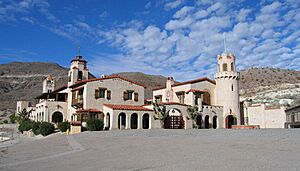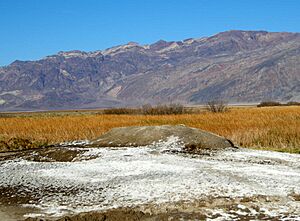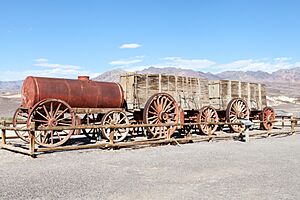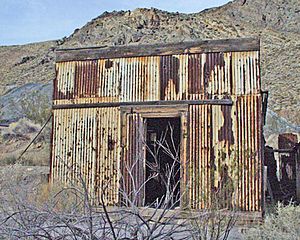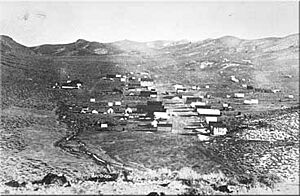National Register of Historic Places listings in Death Valley National Park facts for kids
Death Valley National Park is a super cool place in California, known for being one of the hottest and driest spots on Earth! But it's not just about extreme weather. It's also home to some really important historical sites. These places are so special that they are listed on the National Register of Historic Places. This means they are officially recognized for their historical value to the United States.
There are five main historic places in Death Valley National Park that are on this special list. They tell stories about the people who lived and worked here long ago, from mining towns to unique homes. Let's explore them!
Contents
Historic Places in Death Valley
Scotty's Castle Historic District
Scotty's Castle is a famous historic district located in Grapevine Canyon within Death Valley National Park. It was listed on the National Register of Historic Places on July 20, 1978. This amazing place is not really a castle, but a large, fancy home built in the desert. It was built by a wealthy Chicago businessman named Albert Johnson, but it became famous because of his friend, Walter Scott, also known as "Death Valley Scotty." Scotty was a colorful character who claimed he built the castle with money from a secret gold mine. The castle is a great example of Spanish Colonial Revival architecture and shows how people tried to live in this harsh desert environment.
Eagle Borax Works
The Eagle Borax Works is another important historic site in Death Valley National Park, near Furnace Creek. It was added to the National Register of Historic Places on December 31, 1974. This site was one of the very first places where borax was processed in Death Valley. Borax is a mineral that was used in many products, like soap and cleaning supplies. The Eagle Borax Works played a big part in the early mining history of the area. It shows how tough life was for the miners who worked here.
Harmony Borax Works
The Harmony Borax Works is also located in Death Valley National Park, close to Stovepipe Wells. It was listed on the National Register of Historic Places on December 31, 1974, the same day as Eagle Borax Works. This site is very famous for its connection to the "twenty mule teams." These teams of 18 mules and 2 horses pulled huge wagons filled with borax across the desert to the nearest railroad. The Harmony Borax Works was a major producer of borax in the late 1800s. It helped make Death Valley known for its rich mineral resources.
Leadfield Historic District
Leadfield is a historic district located on the Titus Canyon Trail in the Grapevine Mountains of Death Valley National Park. It was added to the National Register of Historic Places on June 10, 1975. Leadfield was a short-lived mining town that boomed and busted very quickly in the 1920s. People came here hoping to find lead, but the mines didn't produce as much as expected. Today, it's a ghost town with a few old buildings and ruins left. It's a reminder of the excitement and challenges of the mining rush in the desert.
Skidoo Historic District
Skidoo is another historic district in Death Valley National Park, found in the Wildrose District of the Panamint Range. It was listed on the National Register of Historic Places on April 16, 1974. Skidoo was a gold mining town that thrived in the early 1900s. Unlike some other boomtowns, Skidoo had a unique water pipeline that brought water from a spring high in the mountains. This helped the town survive for a while. Like Leadfield, Skidoo eventually became a ghost town when the gold ran out. Its remains tell the story of the miners who sought their fortunes in this remote area.


